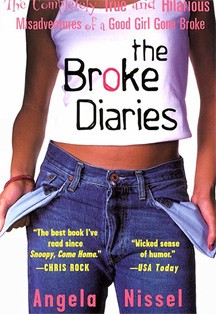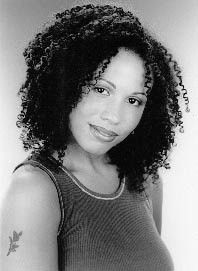
From broke to ballin’
Angela Nissel was your typical struggling college student. Shelived on ramen noodles and financial aid. What started out as justa way for her to unload her thoughts to an audience eventuallyturned into a cult following. Nissel’s “BrokeDiaries” on her University of Pennsylvania Web page were fullof stories about making the best of her situation. Oftentimes theywere laugh-out-loud funny and started circulating as e-mailforwards. One of those forwards linked Nissel to an editor atRandom House, and her Weblog was published. As if that wasn’tgood enough, an eBay sale put her in contact with a televisionproducer and she landed a gig as the staff writer for the NBC show”Scrubs” and moved to Los Angeles.
While a lot of luck was involved, she obviously has talent. Itkind of makes you take a second look at those journals of yours,doesn’t it?
Q: In the book you mentioned using a bound journal as well asa blog. Were the entries basically the same or did you screen thestuff you posted on the blog?
A: I am so unhip that I had to look up what a “blog”was. When I kept the journal on the UPenn Web page, I definitelydidn’t put everything up. I put much more in my writtenjournal. Only once did I post about a relationship-related brokestory online.
Q: When you blogged, did you change people’snames?
A: I changed everyone’s name who wasn’t a closefriend. It was so small I couldn’t imagine that anyone wouldcare if I posted their names. They didn’t. I couldn’tdo it in the book. Random House legal went over the book tooth andnail.
Q: Did you ever catch any heat from people because you talkedabout them (i.e., the chick that lost the “O” on herFord, Turd Boy, etc.)?
A: I don’t know where “O” girl is, but Turdboy kept e-mailing me congratulating me on the book. He woulde-mail me and tell me what page he was on like “Just gotfinished with the caberet story!”, then I never heard fromhim again. I assume he got to the last book entry, which was himleaving a present in my commode. When I visited his city on thebook tour, some special agent dudes were combing the bookstore, andthe train I took to get to NYC was delayed three hours for a bombthreat. I always wonder if Turd Boy did all that.
Q: You never mention the “Internet startup” byname but I heard that it was Okayplayer.com. Is that right?
A: Correct! Okay Player!
Q: Tell me about how you first were recognized by RandomHouse.
A: The diaries I wrote were, unbeknownst to me, stillcirculating around after UPenn had removed my Web site (I’dgraduated). People would e-mail them to friends. How cool is that?Someone e-mailed them to Melody Guy, who was an editor atVillard/Random House back then (she’s since been promoted)who showed them around the office. I was called in and met with thetop brass.
Q: Were you surprised that someone thought your adventures asa broke student were interesting enough for publication?
A: A little bit. I wrote because I loved the challenge ofwriting, period. I never expected to get any money from my brokedays. I knew people thought they were interesting because I wouldget angry letters when I didn’t update them online. “Imiss those Broke Diaries! What the f*** happened? You haven’twritten one in two days. Update it!” I should have made thempay me since they were being all mean, huh?
Q: I knew right away that the art in the book was by AaronMcGruder. How did you hook up with him?
A: I knew Aaron from when I lived in Maryland. We didn’tget along, but had mutual friends. One day, he shot me an e-mailupdating me on what he was doing. One of those “Hey,we’re grown now, let’s get over our differences.”We exchanged several e-mails and damn, he was funny! I wrote partof the book at his place in Los Angeles. He’d be on comicstrip deadline, I’d be on book deadline. It was perfect, twounwashed people sitting down trying to write. When he offered to dosome art for free, I was beside myself. That man works hard andrarely has time to do anything, especially for free.
Q: How did your life change after you became a publishedauthor?
A: People started thinking I had some power to get their bookspublished. Also, I became way more confident as a comedic writer.When you have people you think are wonderful writers praising you,you can puff out your chest a little. I also became more aware ofhow big one’s head can look on TV. When I was on Oprah, Istuttered through half the interview because I was looking at mybig pineapple head on the monitor.
Q: You mentioned writing a sequel to the book. How could youhave as many broke stories if you’ve got a pretty good jobnow?
A: The book is not exactly “Broke Diaries 2,” thoughwhen I moved to L.A., I was struggling. My advance wasn’texactly Steven King money. I get paid a lot for writing for”Scrubs.” I’m very comfortable. Sometimes, I putmyself in odd situations just to get stories. The life of awell-paid Hollywood writer isn’t exactly interesting. Writingfor “Scrubs” is the craziest job I have ever had. Wework long hours and we don’t go home until everything isperfect. The only thing I can liken it to is a jury room.
Q: What director bought the rights to “The BrokeDiaries”?
A: His rights expired so my plan is to develop the TV showmyself when I get out of Scrubs’ training camp.
Q: How did “The Writings of Florence ScovelSchinn” influence you to practice being happy?
A: It’s a simple book that details the game of life andhow to play it. It’s a simple concept actually: Things thatlook bad may actually be for your good. Like, you meet the perfectguy and he dumps you, then you hate him so much you move to anothercity where you find the perfect job. If he hadn’t dumped you,would you have ever moved? I hated being broke, I felt like I wasthe only one at Penn from Philly who was just struggling. I’dsee kids driving their SUVs to class, carrying designer bags and Icould have thought “boy, my life sucks,” but if Ihadn’t been broke I would have never wrote the book and thatbook has put me in a position that I would have never been inbefore. It’s about finding the good in every situation.It’s a good strategy to follow when I couldn’t affordpsychotherapy.
Q: It’s easy to make light of your days at Penn now,but were there times when you just felt completely defeated bybeing broke?
A: Only when it came to things like not having a car to get tothe perfect internship that started so early in the a.m. that nobuses were running. Seriously, though, so many of my friends nevermade it to college and have never been out of southwest Philly.It’s hard to feel bad for yourself when you look at peoplewho are seriously poor and have no idea how to move beyond thatsituation. Being broke is temporary; it’s not hard to makelight of it. Just like when I was little and my mom finally savedup enough money to buy a family car, but the car was so busted thatwater came through the roof when it rained. My mom just pretendedlike it was a new feature on the car. “Look, kids! Indoorwaterfall!” At least we had a car!
Q: Now what’s this about dancing in musicvideos?
A: When I first moved to L.A., I was broke. I took whatever jobsI could find. A couple days after taping Oprah I received an offerto be a dancing extra in a No Doubt video. For the most part,extras get treated very poorly. You can’t eat the hot foodthat’s reserved for the crew, you have to stand outside inthe cold after dancing and sweating. You’re a prop,basically. If the color dress you’re wearing matches GwenStefani’s eye shadow, the director will move you next to her.It was a 12-hour day and I made about $80 and got a free mysterymeat sandwich. A security guard told me I could get an extra $20 ifI danced on his car for him. I passed on that one.
Q: How did you get the gig with “Scrubs”?
A: I posted some items on eBay to make some cash and the womanwho ended up bidding on them was a TV executive. During our backand forth e-mails, she visited my book’s Web site andsuggested I write for TV. She referred me to an agent who loved mybook and agreed I’d be a perfect fit for sitcom writing.Usually, to be a TV writer, you write spec scripts to show that youcan write. They are sample scripts of current TV shows. You sendthem off to agents and hope one actually reads them. I worked on aspec script, but in the meantime my agent sent out my book to showrunners (people who run TV shows). I got several interviews off ofmy book. Bill Lawrence (“Scrubs” show runner) hired meafter reading the book.
Q: What do you like best and least about your job?
A: I like the camaraderie of the staff, I like working in acreepy abandoned hospital. I like hanging out with the actors andgetting their immediate appreciation for your work. I love seeingthings I write come to life. You write a fantasy and it appears. Wewrote a comedic moment featuring Rerun from “What’sHappening.” Next thing I knew, Fred Berry was standingoutside of my office. Only thing is pitching jokes and having themfall flat. Nothing like being in a room of talented people, actingout something you think is funny and having them look at you likethat was horrible. It’s like being a stand-up comedian thatno one laughs at. You have to be on all of the time to be a TVwriter. If that means being funny and being able to outline a22-minute story at 2 a.m., you have to do it. I like thatchallenge, though.
Q: What do you want the people to know about AngelaNissel?
A: I am very very single. I still shop at Goodwill. The bestclothes are there.
Q: Any advice for someone with a negative checking accountbalance, no gas in the car and one pack of ramen noodles?
A: Walk to a basketball game and get a star player to sign yourpack of noodles. Sell them on eBay. Reinvest that money on otherthings to sell on eBay. For real, I still do stuff like that. Iscour thrift stores to look for items in good condition or antiquesthat the staff didn’t know were worth money, then I sellthem. I sold a Chanel shirt for over $100 that I paid $3 for!

From broke to ballin’








